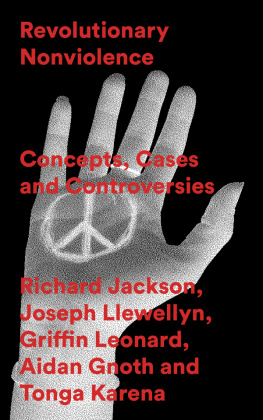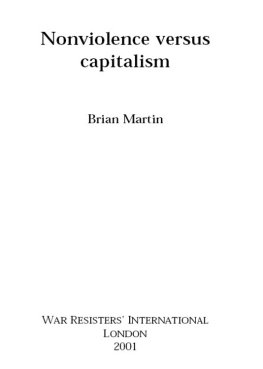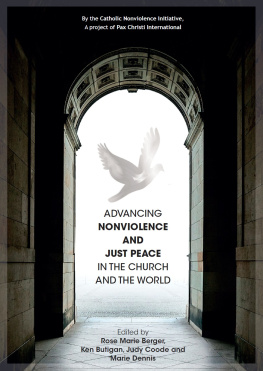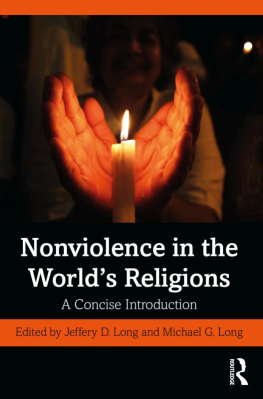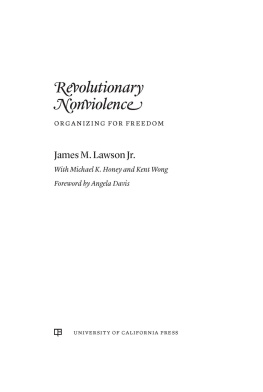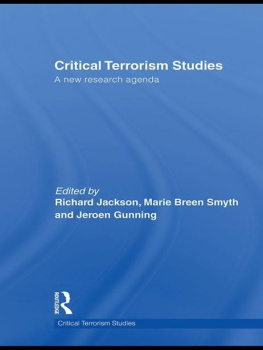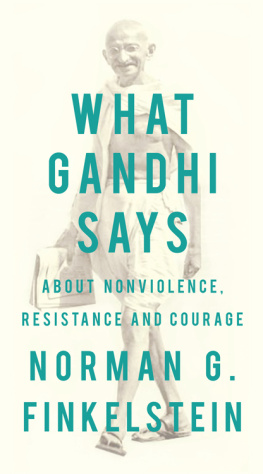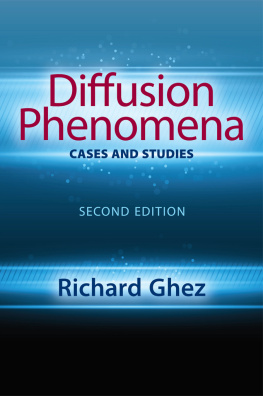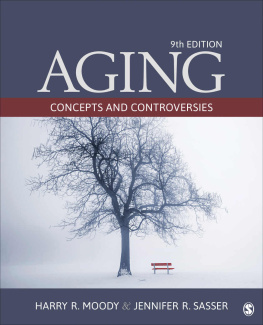Revolutionary Nonviolence: Concepts, Cases and Controversies was first published in 2020 by Zed Books Ltd, The Foundry, 17 Oval Way, London SE11 5RR, UK.
www.zedbooks.net
Copyright Richard Jackson, Joseph Llewellyn, Griffin Manawaroa Leonard, Aidan Gnoth and Tonga Karena 2020
Copyright in this Collection Zed Books 2020
The right of Richard Jackson, Joseph Llewellyn, Griffin Manawaroa Leonard, Aidan Gnoth and Tonga Karena to be identified as Editors of this work has been asserted by them in accordance with sections 77 and 78 the Copyright, Designs and Patents Act, 1988
Typeset in Plantin and Kievit by Swales & Willis Ltd, Exeter, Devon
Index by Adan Suazo
Cover design by Burgess and Beech
Cover photo Jez Coulsson / Panos Pictures
Printed and bound by CPI Group (UK) Ltd, Croydon, CR0 4YY
All rights reserved. No part of this publication may be reproduced, stored in a retrieval system or transmitted in any form or by any means, electronic, mechanical, photocopying or otherwise, without the prior permission of Zed Books Ltd.
A catalogue record for this book is available from the British Library
ISBN 978-1-78699-825-5 hb
ISBN 978-1-78699-824-8 pdf
ISBN 978-1-78699-822-4 epub
ISBN 978-1-78699-823-1 mobi
is undertaking her doctoral studies at the Department of Political Science at Ume University, Sweden. She is researching the dynamics of the fractured leadership and legitimacy of the Palestinian national liberation movement. Her Masters research examined the Boycott, Divestment and Sanctions (BDS) movement. She worked as an associate lecturer at Massey University, New Zealand, teaching both domestic and international political courses.
is an Australian and Fijian national. He holds a PhD from the University of Sydney which applied ieks Bartleby politics to peace and nonviolence theory and the transformation of structural violence. Timothy Bryar is currently an Honorary Associate with the Department of Peace and Conflict Studies at the University of Sydney.
earned his MA and PhD at Brown University after finishing his BA with honours in philosophy. He has been teaching at Hamline University for over 40 years and has been recognised for excellent teaching both regionally and nationally. He is author of From Warism to Pacifism: A Moral Continuum (1989; 2nd ed. 2010), Moral Vision: How Everyday Life Shapes Ethical Thinking (2005), co-author of Humanitarian Intervention: Just War vs. Pacifism (1996) , and co-editor of three anthologies. He has published more than 60 articles in professional journals on the history of philosophy, ethics and nonviolence. Professor Cady was on the National Council of the Fellowship of Reconciliation (FOR) for six years and is a past President of Concerned Philosophers for Peace.
is Professor of Sociology at Eastern Washington University and book review editor at the Journal of Resistance Studies . His dissertation and book discuss the Gandhian repertoires transnational journey from the Indian independence movement to the Black liberation movement in the United States. He has also published on the gay and lesbian movement, Brazilian landless movement (MST), Irans Green Movement, the Egyptian uprising, the violence of nonviolence and revolutionary love, among other subjects related to resistance. He is currently working with Stellan Vinthagen and Carol Daniel on a project concerning decolonising resistance.
is from the Ngti Maniapoto and Waikato Iwi and is a Senior Lecturer in Social Work at the University of Otago, New Zealand. Anaru has a background in youth work, community development, social work and health promotion. While his primary research interests are in contemporary Mori economic and social development, he also has an interest on the impact of religious movements in his tribal area and their impact on Mori economic and social development.
is a Research Assistant and PhD candidate at the National Centre for Peace and Conflict Studies, Otago University, New Zealand. With a background in national and local politics, his research interests focus on how new and emancipatory forms of knowledge can be used to inform and disrupt the policies and practices of humanitarian intervention especially the often unquestioned assumptions around the legitimacy and validity of violence.
is Professor of Peace Studies and Director of the National Centre for Peace and Conflict Studies (NCPACS), University of Otago, New Zealand. He is the founding editor and current editor-in-chief of the journal, Critical Studies on Terrorism , and the author and editor of 11 books and more than 70 journal articles and book chapters. Recent books include: Critical Terrorism Studies at Ten: Contributions, Cases and Future Challenges (2019; co-edited with Harmonie Toros, Lee Jarvis and Charlotte Heath-Kelly); Contemporary Debates on Terrorism (2018, 2nd edition; co-edited with Daniela Pisiou); The Routledge Handbook of Critical Terrorism Studies (2016); Confessions of a Terrorist (2014); and Terrorism: A Critical Introduction (2011; co-authored with Marie Breen Smyth, Jeroen Gunning and Lee Jarvis). His most recent research focuses on pacifism and nonviolence in international relations.
is a PhD candidate at the Peace and Conflict Studies Centre in Otago University. He is an indigenous researcher experienced in the cultural field of custom and ritual, language revitalisation and performance arts. As an orator at Parihaka, the demand to promote customary knowledge within the context of indigenous resistance, nonviolent revolution and tribal self-determination has informed the academic position he uses as part of a critique on the role of indigenous peace traditions in the current global setting. He is engaged, and has two children and he lives on his papa kainga with his whanau at Taranaki, New Zealand.
is an independent researcher based in Dunedin, New Zealand. He blogs regularly on topics relating to New Zealand politics and history, and also works as a relief teacher at Logan Park High School.
is from the Te Arawa iwi and completed his PhD at the National Centre for Peace and Conflict Studies (NCPACS), University of Otago, New Zealand. He continues his relationship with the Centre as a research affiliate. Griffins research interests include: Mori and indigenous perspectives on peacebuilding, resistance and war commemoration; military abolition; US diplomatic history and foreign policy; the use of conciliatory and hostile discourses by political leaders. He is involved in various community and activist groups.
completed his PhD at the National Centre for Peace and Conflict Studies (NCPACS), University of Otago, New Zealand. His research focuses on nonviolence, pacifism, anarchism, Gandhi, Buddhist perspectives on nonviolence, and military abolition. Before conducting his PhD research, Joseph completed a Master of Arts and a Post-Graduate Diploma in Peace and Conflict Studies at NCPACS. Before starting post-graduate study, he trained as an occupational therapist. He has been in various activist groups and projects since he was a teenager.



